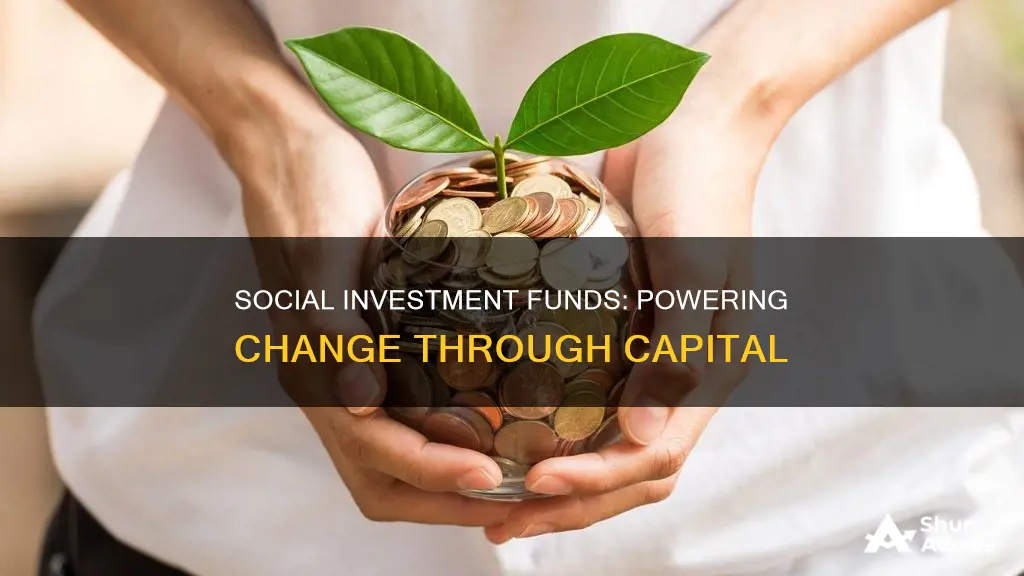
Social investment funds are a type of investment strategy that aims to generate a financial return while also creating a positive social or environmental impact. These funds focus on addressing social issues such as poverty and education, or environmental issues like clean water and renewable energy. Social investment funds are typically centred around impact investing, which involves actively seeking out investments that can create a measurable societal benefit. This approach to investing marks a shift from traditional investment strategies that focus solely on financial gains without considering the social and environmental consequences.
What You'll Learn
- Social funds are institutions that provide financing for small-scale public investments to meet the needs of poor and vulnerable communities
- Socially responsible investing (SRI) is a strategy that views successful investment returns and responsible corporate behaviour as going hand in hand
- Impact investing is an extension of SRI, which focuses on companies that promote ethical and socially responsible consciousness
- ESG investing aims to invest in companies that meet specific environmental, social, or governance requirements
- Socially responsible mutual funds hold securities in companies that adhere to certain social, moral, religious, or environmental beliefs

Social funds are institutions that provide financing for small-scale public investments to meet the needs of poor and vulnerable communities
Social funds, also known as Social Investment Funds, Social Funds for Development, Social Action Funds, National Solidarity Funds, or Social Development Agencies, are institutions that provide financing, usually in the form of grants, for small-scale public investments. These investments are targeted at meeting the needs of poor and vulnerable communities, often in developing countries. Social funds aim to contribute to social capital and development at the local level, empowering and building the capacity of communities and local governments. They also serve as innovators and demonstrators of new methods of decentralized decision-making, management, and accountability.
The first social fund was created in 1987 in Bolivia, and during the 1990s, social funds spread throughout Latin America and Africa with the support of the World Bank and other donors. Social funds have been effective in reaching and empowering poor communities, reducing corruption, and introducing innovations. They have also pioneered community-driven development, where community-based organizations administer funds and decide where to invest them, increasing transparency and accountability.
Social funds typically focus on addressing social issues such as poverty, education, and healthcare, as well as environmental issues like clean energy and climate change. They seek to generate a positive social impact while also earning a financial return. This approach, known as impact investing, is an extension of socially responsible investing (SRI), which focuses on companies that promote ethical and socially responsible practices.
Some examples of social funds or impact investing firms include Vital Capital, Triodos Investment Management, the Reinvestment Fund, BlueOrchard Finance, and the Community Reinvestment Fund, USA. These organizations have invested in various sectors, including renewable energy, sustainable agriculture, healthcare, and education, with the goal of creating positive societal change while also seeking financial returns.
Setting Up an Investment Fund: A Child's Future Security
You may want to see also

Socially responsible investing (SRI) is a strategy that views successful investment returns and responsible corporate behaviour as going hand in hand
Socially responsible investing (SRI) is a strategy that views successful investment returns and responsible corporate behaviour as mutually reinforcing. SRI investors believe that by integrating environmental, social, and governance (ESG) criteria with rigorous investment standards, they can identify securities that will deliver competitive returns while contributing to a better world.
SRI analysts gather information on industry and company practices and assess them in the context of a country's political, economic, and social environment. Generally, SRI investors focus on seven key areas: corporate governance and ethics, environmental concerns, product safety and impact, and indigenous people's rights. They also tend to avoid investments in "sinful" industries, such as gambling, tobacco, weapons, and alcohol.
SRI mutual funds invest in companies that adhere to specific social, moral, religious, or environmental values. To ensure alignment, these funds conduct a careful screening process before investing. While SRI funds may have higher fees due to the additional ethical research required, they offer investors an opportunity to align their investments with their values without compromising returns.
SRI has gained traction due to increasing awareness of global challenges, investor demand for values-aligned opportunities, and evidence that impact investing can compete with or even outperform traditional investments. Impact investing, an extension of SRI, goes a step further by actively seeking investments that create measurable positive social or environmental impacts, such as addressing poverty, education, or clean water access.
Some of the top impact investing firms include Vital Capital, Triodos Investment Management, the Reinvestment Fund, BlueOrchard Finance, and the Community Reinvestment Fund, USA. These firms have billions of dollars in assets under management and focus on areas such as renewable energy, sustainable agriculture, healthcare, and education.
SRI and impact investing allow investors to balance their financial goals with their values and contribute to a more sustainable and equitable future.
Reliance Mutual Fund: A Comprehensive Investment Guide
You may want to see also

Impact investing is an extension of SRI, which focuses on companies that promote ethical and socially responsible consciousness
Socially responsible investing (SRI) is an investment strategy that aims to generate both financial returns and social or environmental impact. SRI can be considered an umbrella term for a range of investment approaches that take ethical, social, and environmental factors into account. Impact investing is one such approach and can be seen as an extension of SRI. While SRI generally involves screening companies based on specific criteria to avoid those with negative social or environmental effects, impact investing takes a more proactive role in creating positive social or environmental change through investment.
Impact investing focuses on companies that promote ethical and socially responsible consciousness. This includes businesses that support environmental sustainability, social justice, corporate ethics, and the fight against gender and sexual discrimination. By investing in these companies, impact investors aim to generate measurable positive social or environmental outcomes alongside financial returns. This approach marks a shift from traditional investment strategies, which often solely focus on financial gains without considering the broader societal and ecological consequences.
The measurement of impact is a key feature of impact investing. This involves evaluating and reporting on both the financial performance and the social and environmental outcomes of investments. This transparency ensures accountability and reinforces the dual objectives of impact investing. Impact investments can be made across diverse sectors, including renewable energy, sustainable agriculture, healthcare, education, microfinance, and affordable housing. These investments are global in scope, spanning both developed and developing countries.
The growth of impact investing has been driven by increasing awareness of global challenges, such as climate change and inequality, and a desire from investors to address these issues. Additionally, evidence suggests that impact investing can compete with, or even outperform, traditional investments in terms of returns and stability. Impact investing provides an opportunity for investors to align their financial goals with their values, promoting ethical and socially responsible practices while potentially achieving competitive financial returns.
Bridgewater Flagship Fund: A Guide to Investing
You may want to see also

ESG investing aims to invest in companies that meet specific environmental, social, or governance requirements
Social investment funds, also known as social funds, are institutions that provide financing, typically in the form of grants, for small-scale public investments. These funds aim to meet the needs of poor and vulnerable communities and they contribute to social capital and development at the local level. Social funds are usually found in developing countries, but they also exist in some developed nations. The first social fund was created in 1987 in Bolivia, and since then, they have spread worldwide, with close to twenty social funds in Africa alone as of 2007.
Environmental, social, and governance (ESG) criteria are used to evaluate companies and investments for their sustainability and social responsibility. ESG investing is a form of sustainable and socially responsible investing that has gained traction in recent years, with ESG-specific mutual funds and ETFs reaching a record $480 billion in assets under management in 2023.
Environmental Criteria
Investors using ESG criteria evaluate a company's environmental impact, including its climate policies, energy use, waste management, pollution levels, natural resource conservation, and treatment of animals. For example, investors may consider a company's direct and indirect greenhouse gas emissions, toxic waste management, and compliance with environmental regulations.
Social Criteria
The social criteria examine a company's relationships with internal and external stakeholders. This includes evaluating the company's workplace conditions, health and safety policies for employees, community involvement, and encouragement of employee volunteerism. For instance, investors may look at whether the company donates a percentage of its profits to the local community.
Governance Criteria
The governance criteria ensure that a company uses accurate and transparent accounting methods, pursues integrity and diversity in its leadership selection, and maintains accountability to shareholders. Investors may require assurances that companies avoid conflicts of interest, do not use political contributions for preferential treatment, and refrain from engaging in illegal conduct.
ESG investing allows investors to screen investments based on corporate policies and encourage companies to act responsibly. By considering ESG factors, investors can make more informed investment choices and support companies that strive to make a positive impact on society and the environment.
A Beginner's Guide to Mutual Funds in the Netherlands
You may want to see also

Socially responsible mutual funds hold securities in companies that adhere to certain social, moral, religious, or environmental beliefs
Socially responsible mutual funds are an increasingly popular investment vehicle for investors who want to balance their desire for profitability with their concern for the future of the planet and other social issues. These funds hold securities in companies that adhere to certain social, moral, religious, or environmental beliefs.
To ensure alignment with the fund's principles, companies undergo a careful screening process before being included in the portfolio. This process evaluates the company's commitment to good corporate citizenship, including factors such as corporate governance, environmental impact, and human rights.
The criteria used in the screening process depend on the fund's theme, values, and goals. For example, a fund with a strong focus on environmental concerns will select stocks of companies that go beyond minimal environmental requirements. Many socially responsible mutual funds also earmark a portion of their portfolios for community investments, contributing to areas such as affordable housing and venture capital in lower-income regions.
Shareholder activism is another important aspect of socially responsible mutual funds. Fund managers use their ownership rights to influence management decisions and promote positive change. This is achieved through various means, such as attending shareholder meetings, filing proxy proposals, and exercising voting rights.
While combining financial returns with social responsibility, these funds have performed comparably to conventional mutual funds. According to MSCI, the MSCI KLD 400 Social Index, comprising socially responsible investments, delivered a 14.18% annualized return over the past decade, while its parent index, the MSCI USA Investable Market Index, returned 13.55%.
Some examples of socially responsible funds include iShares ESG Aware MSCI USA ETF (ESGU), Putnam Sustainable Leaders (PNOPX), and Invesco Solar ETF (TAN). These funds offer investors the opportunity to align their investments with their values while seeking competitive financial returns.
Index Funds: Long-Term Risks and Rewards
You may want to see also
Frequently asked questions
Social investment funds are institutions that provide financing, usually in the form of grants, for small-scale public investments that aim to meet the needs of poor and vulnerable communities. They also seek to contribute to social capital and development at the local level.
Examples of social investment funds include the Romanian Social Development Fund, the Ethiopian Social Rehabilitation Fund, and the Pakistan Poverty Alleviation Fund.
Social investment funds have been effective in reaching poor communities, reducing corruption, and introducing innovations. They have also pioneered community-driven development, increasing transparency and accountability in the use of funds.







